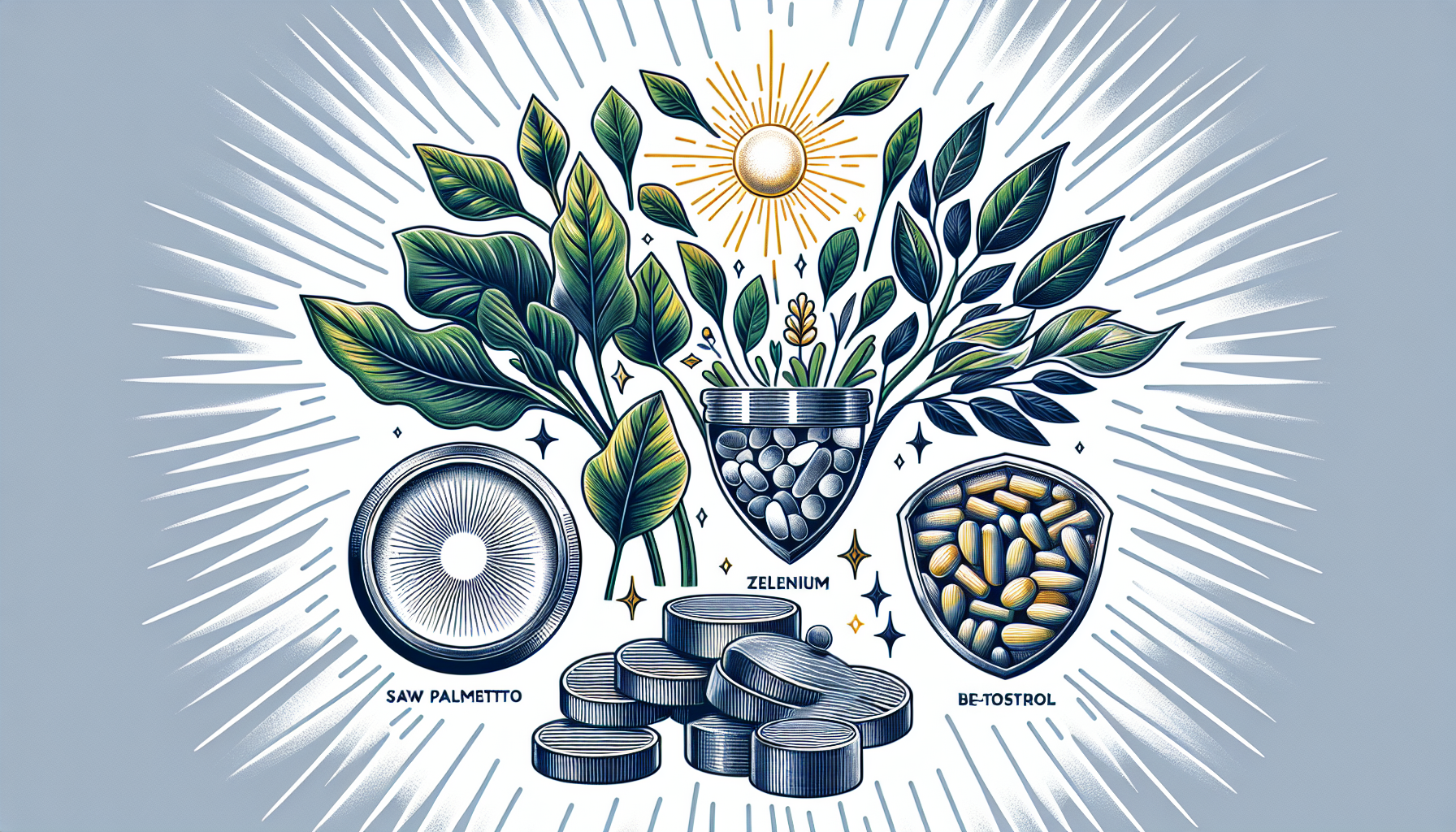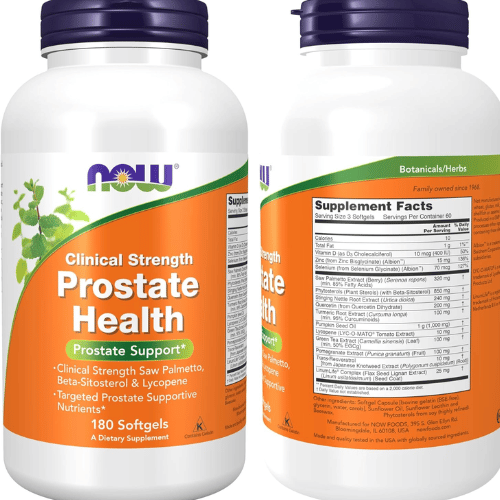Navigating the world of prostate health can be daunting, especially with a myriad of dietary supplements claiming to be the best. Prostate issues such as benign prostatic hyperplasia (BPH) and prostate cancer affect millions globally, making effective management crucial. In this article, we'll explore some of the top contenders for the best supplement for prostate health, including well-known options like saw palmetto and essential minerals such as selenium and zinc. Whether you're trying to prevent prostate cancer, manage symptoms of an enlarged prostate, or support overall prostate health, understanding the role of these supplements is key.
Research suggests that while many prostate supplements offer promising benefits, definitive evidence is still evolving. This includes popular herbal supplements and vitamin and mineral combinations that have been studied in clinical trials for their potential to reduce risk factors associated with prostate diseases. Ingredients like green tea extract, lycopene found in tomatoes, and vitamin D are essential for general health and can potentially reduce prostate inflammation and minimize cancer risk. However, the effectiveness of these supplements can vary, and consulting with a healthcare provider is essential to tailor a strategy that includes routine screenings, a balanced diet, and lifestyle adjustments to support optimal prostate health. Join us as we delve deeper into how these supplements work, their benefits, and their scientific backing to help you make an informed decision.
Key Takeaways
- Prostate health supplements, including botanicals like saw palmetto and minerals such as selenium and zinc, show potential but lack conclusive evidence; consulting a healthcare provider is crucial for safety.
- A comprehensive approach to prostate health involves a healthy diet, regular exercise, moderation in alcohol, and quitting smoking, along with routine screenings to detect issues early.
- Key ingredients like lycopene in tomatoes, green tea extract, and vitamin D hold promise in reducing prostate inflammation and cancer risk. However, their effectiveness varies, and more research is needed.
Discover the Best Supplement for Your Prostate Health

Exploring the realm of prostate health supplements can feel like navigating uncharted waters. With countless options claiming to offer the best support, it's easy to feel overwhelmed by the vast array of ingredients and promises. While some supplements show potential benefits, the evidence supporting their effectiveness can be elusive, leaving many unsure which path to take.
In this journey towards better prostate health, we encounter various compounds, from vitamins and minerals to plant extracts, each touted for their potential benefits. Yet, amidst this diversity, no single supplement emerges as the undisputed champion. Prostate health is complex, and there's no one-size-fits-all solution.
Before embarking on any supplement regimen, seeking guidance from a healthcare provider is essential. They can help navigate the complexities of interactions and potential side effects, ensuring a safe and informed approach. While regulatory oversight of these supplements may be limited, we rely on the guidance of clinical research and anecdotal evidence to chart our course.
Our goal remains steadfast: to improve prostate health and reduce inflammation associated with conditions like benign prostatic hyperplasia (BPH or enlarged prostate) and prostate cancer. With an open mind and a critical eye, we'll explore the supplements that promise to support prostate health, providing a beacon of hope for those seeking wellness in this vital aspect of men's health.
Introduction
As we explore prostate health, we aim to deepen our understanding and provide you, the reader, with the essential information needed to make informed decisions about prostate health supplements. Our journey is grounded in research and enriched by the experiences of those who have navigated these choices before us. This article is designed to be a comprehensive guide packed with insights about the benefits, key ingredients, and user testimonials, offering a thorough review of the supplements that claim to enhance male health.
In the vast array of options available, distinguishing the truly effective supplements from those that offer little more than hope can be challenging. Throughout this article, we will evaluate various prostate health supplements, examining the specific benefits they may offer and the scientific evidence supporting or refuting their effectiveness. With clear goals and precise information, we are ready to delve into the details of the key ingredients that are touted as beneficial for prostate health.
Let’s begin our detailed examination of these supplements and discover which might most effectively support prostate health and well-being.
Key Ingredients in Prostate Supplements

In the quest to promote prostate health, a treasure trove of ingredients is known. Among the most notable are botanicals like saw palmetto and minerals such as selenium and zinc, all known for reducing prostate inflammation. However, it's important to approach these supplements with a critical eye, as the FDA does not regulate them with the same rigor as prescription medications. The research surrounding their efficacy is often based on observational studies, some of which have lasted for decades. These can provide helpful insights but do not offer conclusive proof. However, it is worth noting that some highly regarded nutriceutical companies conduct quality research and even clinical trials on their products and manufacture those products under strict FDA guidelines.
The array of ingredients in prostate health supplements is diverse, and no universally agreed-upon combination or dosage guarantees effectiveness. Scientific research suggests that these supplements might help manage the size and function of the prostate, potentially easing symptoms associated with conditions like benign prostatic hyperplasia (BPH). However, the body of evidence is varied, with studies showing differing results on how ingredients such as beta-sitosterol and prostadine might help improve prostate health.
These supplements are often sought after for their potential to enhance urinary flow and bladder control, which can significantly improve quality of life and manage symptoms. Yet, it's crucial to remember that supplements are not cures for prostate conditions, and their effectiveness in symptom relief can vary widely. As we delve deeper into the specifics of these ingredients, starting with the widely respected saw palmetto, it's essential to consider the importance of consulting healthcare providers to tailor a safe and effective prostate health strategy.
Saw Palmetto
Saw palmetto is a prominent figure in the landscape of prostate health supplements. Extracted from the fruit of a small palm tree, it is touted for its potential to alleviate urinary symptoms associated with benign prostatic hyperplasia (BPH). The supposed mechanism behind saw palmetto involves the inhibition of testosterone’s conversion into dihydrotestosterone (DHT), a hormone that contributes to prostate enlargement. However, the effectiveness of saw palmetto in managing prostate health is still up for debate, with research showing mixed results—some studies suggest it is beneficial. In contrast, others compare its effects to those of a placebo.
Despite the inconclusive evidence, saw palmetto is generally considered safe with mild side effects, typically limited to minor digestive discomfort or occasional headaches. Caution is advised, though, as saw palmetto can interact with blood thinners, potentially increasing the risk of bruising and bleeding. For many individuals, the potential benefits, such as reduced urinary symptoms and decreased inflammation, make it a worthwhile consideration.
As we explore the various options for prostate health, saw palmetto represents a key player in the intersection of natural remedies and scientific research. It highlights the need for a careful and informed approach when considering supplements. Moving forward, we will examine other important minerals in the context of prostate health, specifically selenium, and zinc, to understand their roles and efficacy further.
Our article "A Comprehensive Guide to Choosing the Best Saw Palmetto Supplement" offers a detailed review for readers interested in delving deeper into specific Saw Palmetto products. This guide explores five top saw palmetto products currently available on the market, providing insights to assist you in selecting. Whether you're looking to manage symptoms of BPH or enhance your overall prostate health, this guide can serve as a valuable resource to get you started on finding the right supplement. Check out the full article here for more detailed information and to compare these top-rated options.👇
Selenium and Zinc
In the landscape of dietary supplements, zinc stands out as a crucial nutrient, particularly concentrated within prostate tissue. Its role is significant, contributing to semen production and overall reproductive health. However, research on zinc’s effectiveness in promoting prostate health shows mixed results, with studies often providing inconsistent outcomes.
Similarly, selenium is recognized for its potential protective effects against prostate cancer, offering a glimmer of hope for those concerned about this serious health issue. Yet, the benefits of selenium supplementation are not definitively proven, with some research indicating little to no advantage, especially in older men. Furthermore, it's important to note that excessive intake of these minerals can lead to adverse effects, underscoring the need for moderation.
Genetic factors, such as variations in selenoproteins, can influence how individuals respond to selenium supplementation, highlighting the personalized nature of dietary interventions. Despite these uncertainties, the daily recommended allowances provide guidance, with 11 milligrams for zinc and 55 micrograms for selenium.
As we navigate the complex field of supplements, it’s clear that while selenium and zinc can be beneficial, they are not guaranteed solutions for preventing prostate cancer. Understanding the nuanced role of each nutrient is essential. However, if you are interested in looking into zinc and selenium, you might want to consider them together in one supplement. Our article "The Health Enthusiast's Dream: Five Of The Best Zinc Selenium Supplements You Need to Know" would be a great place to start. You can check it out here. 👇
Next, we focus on lycopene, another promising component in pursuing prostate health, to further explore its potential benefits and the scientific support behind its use.
Lycopene

Lycopene, a potent antioxidant found predominantly in tomatoes, is known for its potential to reduce inflammation and possibly even lower the risk of prostate cancer. Epidemiological studies suggest that lycopene may offer a protective effect against aggressive forms of prostate cancer. However, to fully understand lycopene's impact on prostate health, more human intervention studies are needed. While some animal studies indicate anticancer activity, the results can vary based on dosage, duration, and the nature of the carcinogenic process. The combination of nutrients found in tomatoes may be more effective than lycopene alone in preventing prostate cancer, suggesting that a holistic dietary approach may be beneficial.
Green Tea Extract

Green tea extract, rich in catechins like Epigallocatechin-gallate (EGCG), is celebrated for its anti-inflammatory and anticancer properties. Research indicates that green and black tea extracts may reduce inflammation in the prostate, potentially lowering prostate cancer risk. The recommended intake of EGCG to potentially reduce this risk is about 400 to 600 mg daily, achievable through regular consumption of green tea. Green tea is well-tolerated and considered safe, providing a simple and enjoyable addition to daily routines.
Modified Citrus Pectin
Modified citrus pectin (MCP), derived from citrus peel, is explored for its ability to slow prostate cancer progression by targeting galectin-3, a protein involved in cancer growth. Early studies suggest MCP might inhibit the growth of prostate cancer cells, although these findings are preliminary. While generally safe, MCP can cause gastrointestinal issues in large doses. Ongoing research is necessary to establish the optimal dosage for prostate health benefits.
Vitamin D
Vitamin D plays a critical role in the body, potentially influencing prostate health. Research links higher blood levels of vitamin D with a reduced risk of prostate cancer mortality. However, the evidence supporting the use of vitamin D supplements for preventing prostate cancer is still developing. The National Cancer Institute highlights the need for further research to clarify this relationship. Vitamin D can be obtained through sunlight exposure and diet, but supplementation should be approached cautiously, especially in individuals with prostate cancer, due to the risks of toxicity.
Herbal Supplements
Herbal supplements like pumpkin seed oil and rye grass pollen extract are considered for their potential benefits in alleviating prostate discomfort. The effectiveness of these supplements varies, and high doses or simultaneous use of multiple supplements can lead to adverse effects. Men with a family history of prostate cancer often turn to these supplements, though it's crucial to choose products that are third-party tested and to consult with healthcare providers to ensure safe use.
Adding to the discussion of herbal supplements beneficial for prostate health, one standout product is the Clinical Strength Prostate Health by NOW Supplements. This product is particularly notable due to its comprehensive formulation that combines a variety of herbs, vitamins, and minerals, all aimed at supporting prostate health. Ingredients include vitamin D, zinc, selenium, saw palmetto, pumpkin seed oil, lycopene, green tea extract, and turmeric root extract. These components are known for their roles in promoting prostate health, from anti-inflammatory effects to antioxidant protection.
With over 4,300 reviews on Amazon, of which 3,550 rate it between 4 and 5 stars, this supplement has earned the trust of many users. The diversity of its ingredients reflects the latest research in prostate health and offers a synergistic approach to maintaining prostate wellness. Additionally, NOW Supplements is recognized for its high standards in production, boasting an NPA A-rated GMP certification. This certification ensures that every batch of supplements meets rigorous quality controls, making this 46-year-old company a leader in the nutraceutical industry. For those considering herbal supplements for prostate health, Clinical Strength Prostate Health represents a reliable and well-formulated option.
Soy Isoflavones
Isoflavones found in soy, such as genistein and daidzein, are noted for their potential protective effects against prostate cancer. Observational studies suggest that diets high in soy foods are associated with lower prostate cancer rates, particularly in Asian countries. Clinical trials indicate that soy might help manage PSA levels in men with prostate cancer. The recommendation is to prefer whole soy foods over supplements for safety and overall health benefits.
Comprehensive Approach to Prostate Health

A comprehensive approach to prostate health includes:
- Like the Mediterranean and DASH diets, eat a healthy diet rich in fruits, vegetables, and fats.
- Regular physical activity to reduce inflammation and support overall health.
- Regular check-ups with healthcare providers, including those specializing in complementary and integrative health.
Diet for Prostate Health
A well-rounded plant-based diet is foundational for maintaining prostate health. The Mediterranean and DASH diets, known for emphasizing fruits, vegetables, and healthy fats, are particularly beneficial. Men in Western countries, where prostate cancer rates are higher, might benefit from adopting the dietary practices common in Asian countries, which are predominantly plant-based.
Key components of a prostate-friendly diet include:
- Legumes and leafy greens: These provide essential nutrients and fiber.
- Berries: Rich in antioxidants, they help combat oxidative stress.
- Cruciferous vegetables: Vegetables like broccoli contain sulforaphane, which is noted for its anti-cancer properties.
- Fatty fish: A great source of Omega-3 fatty acids crucial for reducing inflammation.
- Pumpkin seeds and walnuts: These are loaded with zinc, selenium, and vitamin E, all of which are important for prostate health.
- Garlic: Known for its sulfur compounds, garlic helps protect against prostate cancer and benign prostatic hyperplasia (BPH).
Choosing foods that reduce inflammation and inhibit cancer growth is crucial for prostate health. However, it's also important to avoid charred meats and trans fats, which can harm overall health. A diet rich in these beneficial foods strengthens the foundation for good prostate health, setting the stage for the next step in maintaining wellness: regular physical activity.
Exercise and Prostate Health
Exercise is a crucial component in the pursuit of prostate health. Regular physical activity helps reduce inflammation and strengthens the immune system, which can protect against cancer. Beyond its role in cancer prevention, exercise is vital for cardiovascular health and can help mitigate the side effects of prostate cancer treatments.
Various types of exercise are beneficial for prostate health:
- Walking: A simple and effective exercise that is easy on the body.
- Swimming: Offers a full-body workout and is particularly good for those looking for low-impact options.
- Cycling: This can be a great option, provided a comfortable seat is used to avoid putting pressure on the prostate.
Additionally, Kegel exercises are important as they strengthen the pelvic floor muscles, helping to manage symptoms like frequent urination, a common issue for those with prostate health concerns. For individuals undergoing androgen deprivation therapy (ADT), incorporating a mix of resistance and aerobic exercises is important to counteract muscle loss and maintain overall physical function.
Individuals can significantly enhance their prostate health and well-being by integrating exercise into daily routines. Regular physical activity is not just beneficial; it's a key part of maintaining health and enhancing the quality of life as part of comprehensive prostate health management.
The next leg of our journey takes us to the doctor's office, where the importance of regular screenings and check-ups is charted out with precision and care.
Screening and Regular Check-Ups
Vigilance is essential in managing prostate health, which includes regular screenings and check-ups. Prostate cancer is the most common non-skin cancer among men in the United States, making it a significant concern, but early detection through PSA testing is crucial. The PSA test helps detect signs of prostate cancer or other conditions like prostatitis or an enlarged prostate.
An elevated PSA level can indicate the need for further tests, such as biopsies, to confirm the presence of prostate cancer. Detecting the disease early can significantly reduce the risk of dying from it. Men at high risk of prostate cancer should discuss the frequency of screenings with their healthcare provider, while those at average to low risk might not need to be screened as often. Notably, the UK does not have a national screening program for prostate cancer, partly because the PSA test can sometimes produce false positives, which might suggest a higher risk of prostate cancer than exists.
Your primary care physician plays a crucial role in your overall health management, including monitoring symptoms related to prostate health and deciding if specialized care is needed. Regular check-ups help ensure any potential health issues are identified and managed early, contributing to smoother and more effective treatment. Understanding the importance of these practices is crucial for maintaining health and longevity. As we recognize the value of regular medical oversight, we move on to consider the lifestyle changes necessary for enhancing and preserving prostate health.
Lifestyle Changes
The journey towards prostate health is influenced significantly by our daily lifestyle choices. Maintaining a healthy weight is essential as it helps reduce the risk of prostate cancer and its more aggressive forms. Similarly, quitting smoking is crucial; it not only reduces the likelihood of developing prostate and other cancers but also enhances overall health.
When it comes to alcohol consumption, moderation is crucial. Here are some tips for maintaining a healthy balance:
- Limit alcohol intake to one drink per day for women and two for men.
- Choose red wine when possible, as it contains resveratrol, which may offer antioxidant benefits to prostate health.
- Consider the frequency of ejaculation, as some research suggests it may help reduce the risk of prostate cancer.
These guidelines can help maintain a healthy prostate and reduce the risk of related health issues.
The lifestyle adjustments we make can significantly influence our long-term health outcomes. By adopting a diet rich in nutrients, engaging in regular exercise, moderating consumption of alcohol and tobacco, and staying vigilant with regular medical screenings, we can effectively support our prostate health. These proactive steps are not just preventative measures but are integral to maintaining overall wellness and achieving a balanced lifestyle. As we conclude our discussion, we reflect on the comprehensive approach we've outlined, ready to implement these strategies for a healthier future.
Wrapping Up Our Journey Into Prostate Health
As we conclude our exploration of prostate health, it's clear that managing this vital aspect of men's health is not reliant on a single solution but involves a comprehensive and integrated approach. Prostate health is best supported through dietary choices, regular physical activity, vigilant health screenings, and the judicious use of supplements. Key supplements such as saw palmetto, selenium, zinc, and lycopene have shown potential in supporting prostate health. However, the effectiveness of these supplements can vary, and they should be considered as part of a broader strategy that includes lifestyle modifications and regular consultations with healthcare providers.
The importance of a nutrient-rich diet cannot be overstated, with foods rich in vitamins and minerals essential for reducing the risk of prostate issues such as benign prostatic hyperplasia (BPH) and prostate cancer. Regular exercise contributes not only to overall cardiovascular health but also helps manage weight and reduce the risk of prostate diseases. Screening and regular check-ups are critical for early detection and management of potential prostate problems, enhancing the effectiveness of treatment and intervention strategies.
Moreover, we recognize that prostate supplements are not regulated by the FDA with the same rigor as prescription medications, underscoring the necessity to always select from the top supplement manufacturers that follow FDA manufacturing standards and third-party testing of their products. In addition, consulting a healthcare professional before beginning any new supplement regimen is essential.
By adopting a holistic approach to health that incorporates proven dietary strategies, regular physical activity, and informed supplement use, individuals can significantly improve their prostate health. This proactive and informed approach ensures that every aspect of health is managed with the utmost care, supported by clinical trials, and guided by the expertise of medical professionals.
Still Not Sure? Here are Some Brief Answers to FAQs
Can prostate supplements cure or treat prostate-related issues?
No, prostate supplements cannot cure or treat prostate-related issues. While they may help with symptom relief, they should not replace medical treatment.
Are there any risks associated with taking prostate health supplements?
Yes, there are risks associated with taking prostate health supplements. They may interact with medications like blood thinners, potentially causing adverse effects. Therefore, consulting with a healthcare advisor before starting any supplement regime is critical.
What lifestyle changes can I make to support prostate health?
To support prostate health, maintain a healthy weight, quit smoking, consume alcohol in moderation, exercise regularly, manage stress, and ensure adequate sleep. These lifestyle changes help lower the risk of aggressive prostate cancer and support overall health.
How often should I be screened for prostate cancer?
Discuss the frequency of prostate cancer screenings with your healthcare provider, taking into account factors such as age, family history, and personal health to determine the appropriate screening schedule. High-risk individuals may require more frequent screenings, while those with average to low risk may need them less often.
Is it better to get nutrients from food or supplements for prostate health?
It is better to get nutrients from food rather than supplements for prostate health. Foods like tomatoes, fatty fish, cruciferous vegetables, and whole soy products provide a broad range of nutrients and other beneficial compounds. Supplements should complement, not replace, a healthy diet.
Thanks for taking this journey to explore the best supplement for prostate health. If you want to add to your library of knowledge and are interested in diving deeper into some of the supplements mentioned in this article, you should check out the links above. It could be a huge time-saver - you won't be sorry you took a look.
Also, please return soon to check out our next review of another incredible supplement – we’re always looking out for YOU!
*We are NOT qualified medical advisors. The content here is only based on our personal opinions and research and should NOT be used as a substitute for a healthcare professional's advice!
**This site contains affiliate links. We may earn a small commission through links in this post.












Member discussion